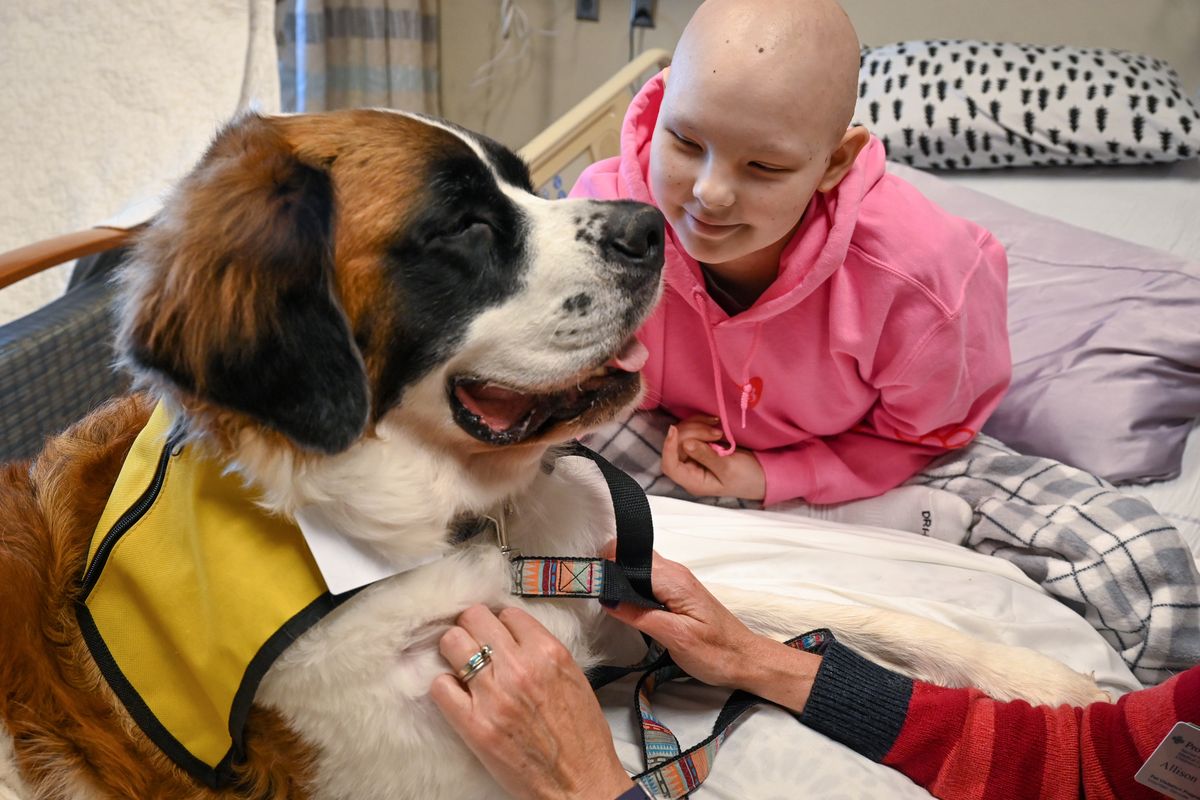Spokane hospitals invite back therapy dogs with call to expand canine care: ‘It lightens their load for just a few minutes’

Margaux the Saint Bernard stretched across the hospital bed on top of a sheet set out just for her. With a slight moan, she gazed up into the face of Peyton Adams, 14, who exuded glee.
“I love dogs so much,” Peyton said. “She’s so smoochy, soft and drooly.”
Any drool fell on that extra sheet, and both canine and patient seemed enamored. Before visiting, the nearly 100-pound Margaux – pronounced Margo – got a bath and grooming, and only gets bedtime if a patient wants that. Otherwise, she stands bedside or sits in a chair nearby.
This fall, both Providence and MultiCare hospitals have renewed calls for such registered pet therapy volunteers, after animal-assisted programs were temporarily halted during the pandemic. Both hospital systems plan to expand the handler-dog visits if enough people sign up.
Peyton wanted Margaux to be close, as her mom Heather Adams and the dog’s owner, Allison Miller, sat bedside.
At Providence Sacred Heart Children’s Hospital, Peyton has undergone treatment for Ewing sarcoma, diagnosed in February 2020. It’s a type of cancerous tumor usually occurring in the long bones of the arms and legs, and mainly affecting children and young adults.
Heather Adams said the sarcoma was removed from her daughter’s lower left leg, but Peyton also needed alternating days of chemo sessions for months. At the hospital for final chemotherapy Nov. 14, Peyton said she’d do another treatment if it meant a therapy dog visit.
“I’m so nauseous the whole time; I’m miserable, but when a dog comes in, it completely goes away,” she said.
At her Spokane home, Peyton has her own dog, a blue Weimaraner named Scout.
The hospitals’ dog volunteers must meet requirements of Pet Partners, a national organization that screens and registers therapy animal handlers and their pets to visit hospitals, assisted-living centers and other sites.
Studies have shown the bond between people and pets is linked to several health benefits, including decreased blood pressure, anxiety and feelings of loneliness, the Centers for Disease Control and Prevention says.
Therapy dogs also bring instant smiles to faces, even when hospitalized children are fearful or in pain, said Miller, a volunteer for 11 years with the Providence Pet Visitation Program. Margaux is her third therapy dog.
“It has been shown by studies to decrease stress, anxiety, blood pressure, depression and even pain for a dog to visit,” Miller said. “I’ve had some incredible experiences, to walk into a kiddo’s room and they’ve been sad and maybe crying. You walk in and they see the dog, and a smile flashes on the patient’s face.
“It makes a big difference for the families as well. With kids with cancer, you can imagine how a parent is stressed, and it’s so overwhelming. When you bring in the dog, it brings everything down a notch in the room. It lightens their load for just a few minutes.”
At Sacred Heart, Miller works with another volunteer who is a pet-team escort, going into a hospital room beforehand to ensure a patient is ready, remove obstacles like a food tray and put a sheet on the bed to catch dog hair. The volunteer handler minds the dog kept on a leash.
Pediatric patients who are scared about an upcoming procedure feel calmer as they pet the dog, and it offers a distraction, Miller said. Often, patients describe missing their pets at home.
MultiCare’s Jennifer Tucker, local volunteer services director, said its pet therapy program also has returned, after a pause from COVID-19.
“We want to build back the pet therapy at both MultiCare Deaconess and Valley Hospital,” Tucker said.
Bailee Walters, Deaconess intensive care unit nurse manager, occasionally brought her pet-therapy registered golden retriever, Ranger, to visit nurses and health care workers outside the facility during the pandemic to relieve stress, she said.
“During that bad omicron wave that came through, and visitors weren’t allowed, when I walked around talking to staff, people were just sad,” Walters said.
“Dogs just bring smiles to faces. Upon further research, I found out how great the visits also are for patients. It reduces anxiety, gives them comfort and releases endorphins – all things to help in the recovery of patients. The hopes are with COVID minimizing, we can get more dogs into patient rooms.”
Walters said staff would welcome hypoallergenic dogs such as poodles to visit patients with pet allergies if requested.
Vaccines are required for both handlers and dogs to visit hospitals. More information on the Pet Partners registration process is online. Dogs must be at least 1 year old, have obedience training and be welcoming to strangers with no history of aggression, among criteria.
Miller, a Diamonds in the Ruff instructor, said a therapy class is offered three times a year there to prepare for the Pet Partners’ exam. She also recommends that dogs pass American Kennel Clubs’s Canine Good Citizen test.
Providence has about 10 dogs in the program, which also needs more escort volunteers. More information is on its volunteer services website, volunteersinwa.providence.org.
MultiCare has a link on its MultiCare.org/volunteers site for pet therapy, or contact Tucker by email at jennifer.tucker2@multicare.org.